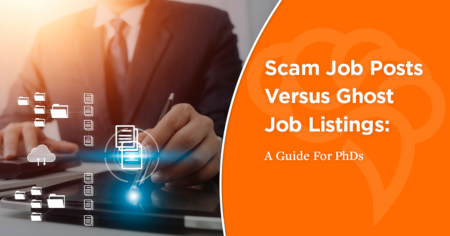3 Transferable Skills PhDs Already Possess (And Employers Value)

When I started applying for jobs after getting my PhD, I didn’t even know what transferable skills were.
I heavily emphasized my technical skills. After all, I had spent the last 5 years perfecting them. But application after application I never heard anything back.
When I really began to analyze the job descriptions I realized the technical skills were not all they emphasized. Words like “communication”, “collaboration”, and “independent worker” continuously popped up again and again. It hadn’t dawned on me before that these are skills known as transferable skills.
I realized that people cared more about whether I could have a pleasant conversation than my technical skills. Being able to transition into the company culture was more important than my ability to troubleshoot an experiment.
My technical skills meant I could do the job. To get hired, I had to show that I was a pleasant person to work. That I understood the work environment of companies in industry.
Once I understood this, I started thinking about the transferable skills I already had. I added them to my resume and tried to highlight them in my interviews. I also took some time after each interview to ask how could that have gone different; enhancing my communication skills. Everything became less about my technical ability and more about how my transferable skills and experiences made me a better qualified candidate.
I started getting more responses. After a few weeks, I received a message from the hiring manager of one of my target companies. It was an official job offer. I attribute this job offer to my mindshift around the importance of transferable skills.
What Are Transferable Skills And Why Do You Need Them
Transferable skills are sometimes called soft skills. These are skills that you are able to transfer to any job you go to. For instance knowing how to run a qPCR might be important. This technical skill is not necessary if you move up to a management position. Whereas leadership skills will serve you well both in the lab and in management.
As PhDs we are trained to think that our technical skills are what sets us apart from other candidates. In reality, industry hiring managers are looking for your transferable skills.
People hiring for PhD-level positions know that you have a strong technical background and can learn new technical skills faster than other candidates. However, you need to show them that you can communicate results or work collaboratively. In other words, that you won’t be an awkward PhD who can’t function in a work environment.
Transferable skills are a great asset in your job search that you should highlight. And as a PhD you already have many transferable skills that are valuable in industry. If you don’t believe me, check out this Ebook.
Knowing how to showcase your transferable skills can skyrocket your job search and make you more marketable. Some of the most sought after transferable skills are communication, business acumen, and professional awareness. In this post, we will take a deep dive into each of these transferable skills.
1. Communication skills
Communication skills is an umbrella term that encompases some of the top transferable skills in most industries. Throughout your PhD, you’ve already developed both oral and written communication skills through presenting at lab meetings/conferences and publishing papers. But there are some key differences when it comes to communicating in industry and in academia.
The first being your audience. When you communicate in a lab meeting, everyone has a basic understanding of the research. Most people you are communicating with understand the methods and the jargon of your niche area. However, in industry, you will be talking to people who have completely different backgrounds from yours and while they may know simple terms like “DNA,” they will not understand the intricacies of troubleshooting a DNA extraction or what equipment like a flow cytometer does.

Communication skills are not about what you want to say. It’s about conveying your message in a way the other person can understand and relate to. When communicating, always think of how the other person might be perceiving you.
A second way communication is different in industry and in academia is in showing emotion and personality. Academic writing can be very rigid and filled with jargon. We are trained to use words like ‘utilize’ not ‘use’ and to create publications with no emotion or personality. Likewise, presentations with all white backgrounds and little humor are the norm at conferences. When communicating in a industry setting, you still need to be true to the data and show your credibility, but showing personality and using storytelling is very important. It will help you build relationships and rapport with clients and co-workers.
Relationship Building
Truth is, if you can’t build relationships, you will not go far. If you can’t interact well with others, you will not be successful. Relationship building ties closely with communication skills but with some important nuances.
Communication can be just a single interaction, while relationship building is a continuous process. People without relationship building skills are unable to compromise when they disagree with others. Whereas those who excel at relationship building can use their emotional intelligence to find solutions that leave everyone satisfied.
The best way to build relationships is to avoid being argumentative and try to foster safe collaborative spaces. Try to understand the perspective of the other side and use phrases like: “That’s an excellent point but have you thought of….”. This way, the person you are talking to will feel like you’ve valued their opinion but also are capable of thinking on your own.
Emotional intelligence
This is one of the more underrated transferable skills closely associated with communication skills. Emotional intelligence, sometimes called emotional quotient, is your ability to be aware of someone else’s emotions (including your own). It includes how you handle these emotions judiciously and empathetically. Whether you are in the lab or behind the computer all day, having emotional intelligence is beneficial. People with high emotional intelligence handle adverse and stressful situations better.
If you’ve ever been in a stressful situation, or feel like you were walking on eggshells with a labmate, you’ve used your emotional intelligence.
Enhancing your emotional intelligence and overall communication can take a lot of introspection. You need to be aware of how you react to people and the environment. Especially in a stressful situation. Always reflect after an argument and ask yourself how could I have made that interaction better? This will improve your emotional intelligence, which will help you build rapport and ultimately improve your communication.
2. Business acumen
Business acumen is a broad term that has a number of definitions. Ultimately refers to understanding how a business achieves its goals and objectives. This requires knowledge in how a business makes money, obtains and keeps customers, and survives in the face of its competitors. So, business acumen is really the accumulation of several transferable skills applied through a business lens, largely strategic thinking and industry knowledge.

As a PhD, you’ve already been developing your business acumen skills. You understand the products that you work with and the importance of producing quality results within a budget. You need to communicate this in an industry setting and broaden your perspective.
There are a number of ways to increase your business knowledge, from taking courses at your university to finding free courses on the internet. Reading blogs in the biotech or other industries that you are interested in will also keep you up to date on the trends. Joining one of Cheeky Scientist’s advanced programs like ScientistMBA or PhDCEO will also provide you with a number of resources and knowledge to increase your business acumen.
3. Professional awareness
Professional awareness is more than just dressing appropriately for an interview. It’s about developing your professional brand both in person and online, learning from your experiences and finding the right mentors.
If you cold message someone on LinkedIn for an informational interview or a connection, they will likely check out your profile before they accept; so your profile better highlight your professional brand. Your profile should show them you are a professional dedicated to the industry. This means having a headline that is unique and captivating and a headshot that is professional and clear.
Coming straight from graduate school you may feel you have no industry experience. But don’t mix up experience with activity. Others may have years in the industry over you but if they’ve just been following the same routine for all those years they don’t have experience. Meanwhile you’ve been in the lab, trying out new things, creating knowledge, learning how to deal with failure, how to adapt to change, and how to juggle multiple projects during stressful situations. You may not be in industry but you have experience in a number of different areas that industry values.

Finally, you want to find a good mentor. A good mentor can help you see what you cannot when it comes to professional awareness. They will be able to draw on their experiences to help elevate your professional awareness and help you succeed. The Cheeky Scientist network is a great resource to find the perfect mentor for you.
In Conclusion
You may think your technical skills are what sets you apart in a job search, but employers actually pay more attention to transferable skills. You need extraordinary communication, exemplary business acumen, and high professional awareness to successfully transition into industry, especially before the end of the year.
If you’re ready to start your transition into industry, you can apply to book a free Transition Call with our founder Isaiah Hankel, PhD or one of our Transition Specialists. Apply to book a Transition Call here.

ABOUT ELIZABETH DEYETT
Elizabeth holds a PhD in genetics, genomics and bioinformatics. Now she combines her passion for science and writing as a consultant and freelance medical writer.
More Written by Elizabeth Deyett































